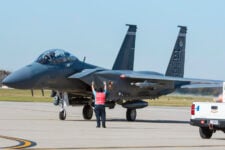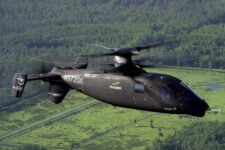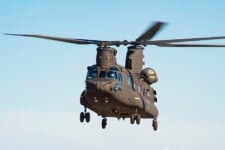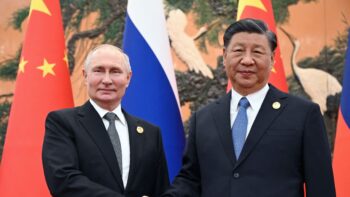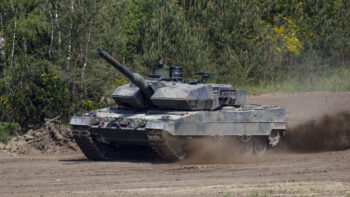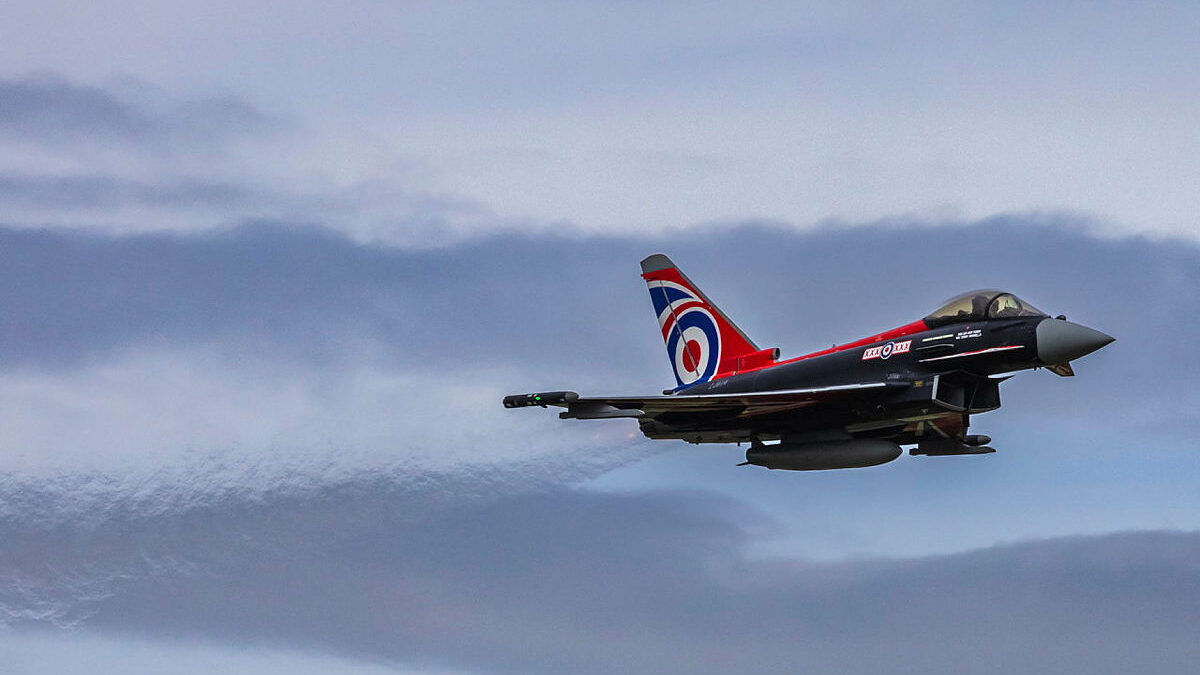
A Royal Air Force Eurofighter Typhoon “Blackjack” on display at the Royal International Air Tattoo (UK MoD)
DUBAI — To help fill its looming fighter gap, Turkey is in talks to buy 40 Eurofighter Typhoons, the country’s top defense official said, in a move analysts said could give Ankara bargaining power in its years-long quest for new American F-16s but could also face resistance in Berlin.
Turkish Defense Minister Yasar Gular said Thursday at a parliamentary hearing that Turkey is “working on procurement.”
“Now the UK and Spain are making efforts to convince Germany, [though] we are not in talks with Germany… If possible, we plan to purchase 40 Eurofighter Typhoon jets,” he said.
Turkey is currently facing a fighter gap as it waits for its planned 5th generation KAAN fighter to come online in 2030. As the Turkish air force already flies F-16s, it has sought new versions of the plane from the US, but that deal has been on hold over geopolitical strain between Turkey and the US.
RELATED: Turkey ‘not coming back’ to F-35 program as NATO trade, HASC chairman says
So the “contemplation” of the Eurofighter “serves a dual purpose,” according to Ali Bakir, nonresident senior fellow at Atlantic Council’s Scowcroft Middle East Security Initiative. He said the talks “could either act as a strategic leverage in negotiations with the US over the F-16s or complement it, depending on the outcome of these discussions.”
“I believe the ongoing negotiations for the F-16 deal, marked by prolonged delays and uncertainties, have led Turkey to consider the Eurofighter as a viable alternative,” he said. “From the Turkish perspective, historical patterns reveal a lack of reliability in dealings with US administrations, with Congress often exerting its power to halt defense agreements unpredictably.”
Can Kasapoglu, director of defense research at the Istanbul-based Edam think tank, emphasized that a successful Eurofighter deal wouldn’t necessarily preclude an F-16 deal as well — but it would eat into F-16 maker Lockheed Martin’s “dominance over the Turkish weapons market in the fighter segment.”
“Turkish air power has a stopgap trouble up until the indigenous KAAN makes it,” Kasapoglu said. “The [Eurofighter] can offer some relief, depending on the tranche.”
Will Berlin Balk?
Gular’s assertion that the UK and Spain are attempting to convince Germany to approve the sale highlights the potential logjam in Berlin.
Any of the four partners in the Eurofighter consortium — the UK, Germany, Italy and Spain — can veto an export order and have used such a power in cases where prospective buyers have been subject to an arms embargo. For that very reason, Germany continues to block a second tranche order to Saudi Arabia, which shows no sign of progress despite UK Prime Minister lobbying Germany’s Olaf Scholz to overturn the ban.
“Turkey’s approach to securing the Eurofighter deal involves leveraging diplomatic relations, with the UK and Spain playing pivotal roles in persuading Germany not to veto the agreement. However, Germany’s history of imposing restrictions and sanctions on defense deals with Turkey, often under dubious or politically motivated pretexts, remains possible,” Bakir told Breaking Defense.
He said that if Germany obstructs deal, Turkey would be propelled to seek other options further afield.
“The acquisition of the [Russian] S-400 missile system is a testament to Turkey’s readiness to explore non-Western options when its supposed Western allies block its reach to defense equipment vital to its defense strategies,” Bakir added. ” If Germany were to impede the Eurofighter deal, it would reinforce Turkey’s rationale to seek alternatives, validating its reach out to non-Western defense markets.”
Eurofighter Builders’ Warning
Other developments in Germany could affect Turkey’s bid for Eurofighters as well.
Long term production of the Typhoon has been thrown into doubt in recent days with Airbus and Germany’s metalworkers union IG Metall holding an “action day” in Manching, home to Eurofighter’s largest production line, demanding the German government deliver Tranche 5 jet and Long Term Evolution (LTE) contracts or face the prospect of a production shutdown in 2030.
The warning contrasts with trade media being told at the Paris Air Show in June that up to 200 Eurofighter jets could potentially be ordered in the next two years. As of October 2023, a total of 83 aircraft are on order, per program figures.
Spain has also committed to buy an additional 25 Eurofighter Tranche 4+ jets under Halcon 2, an acquisition to replace Boeing EF-18 Hornets. An order is expected in 2024 once a Request for Quotation phase has been completed, a Eurofighter consortium official told Breaking Defense at the International Fighter Conference last month.
The UK’s BAE Systems, one of three industry partners from the consortium, alongside Italy’s Leonardo and Germany’s Airbus, maintains close ties with Turkey, even collaborating with Turkish Aerospace on the design of KAAN.
The two manufacturers signed a landmark deal worth more than £100 million ($124 million) in 2017, based around a plan, with the potential, “to deliver multi-billion pound contracts between Team UK and Turkish firms over the life-time of the project,” according to the UK MoD.
Neither BAE nor the UK Ministry of Defence responded to a request for comment for this report as of publication.
Australia tops up Ukraine military aid with $100M
Australia has already supplied Ukraine with 120 Bushmaster vehicles, six 155mm howitzers, 56 M113 armored vehicles, 14 special operations vehicles and its signature cardboard drones.


